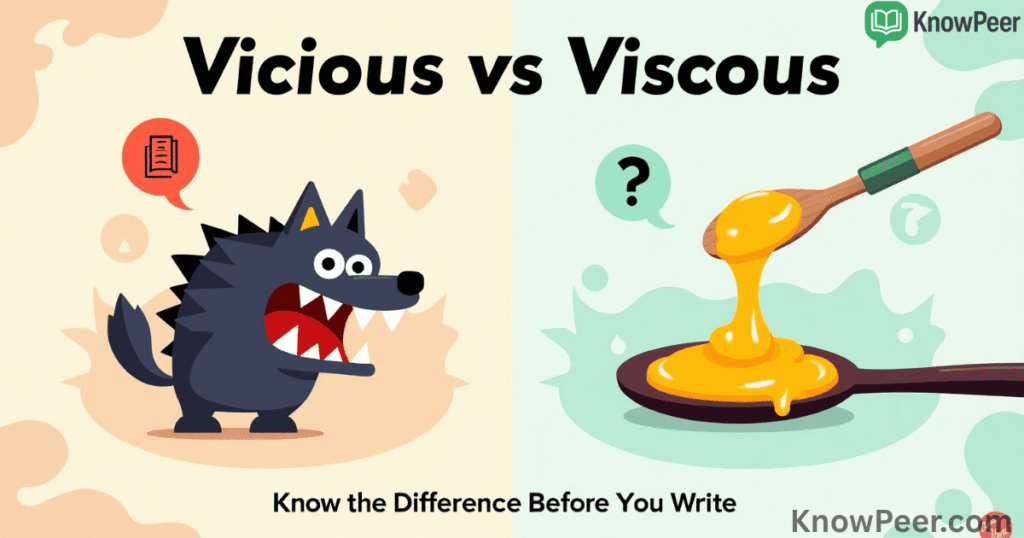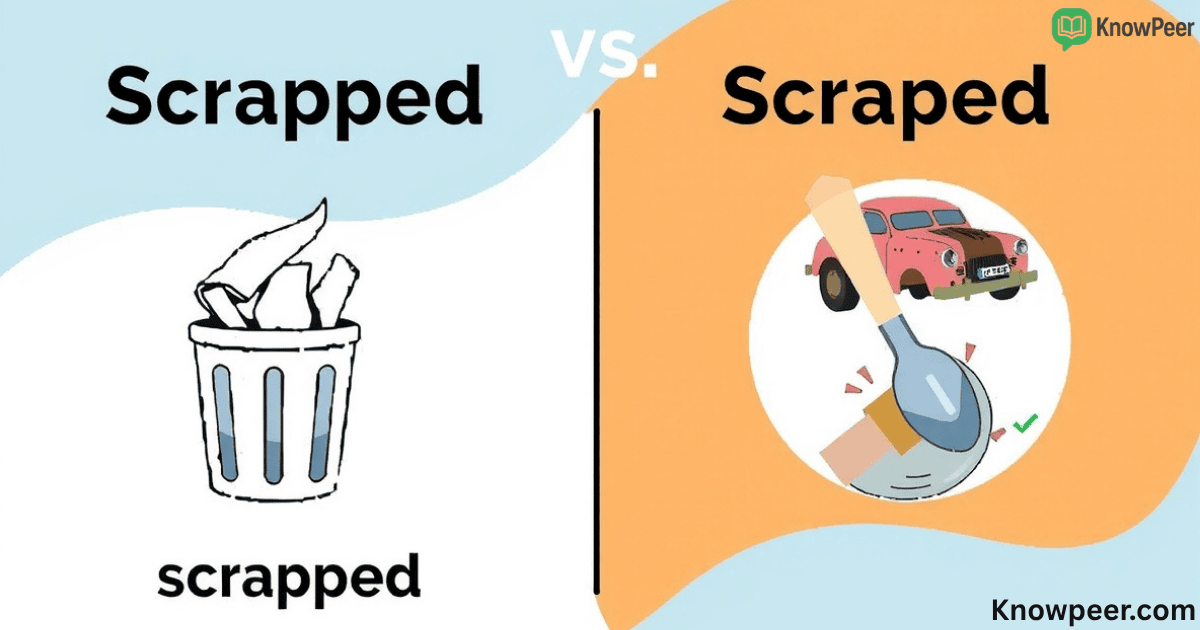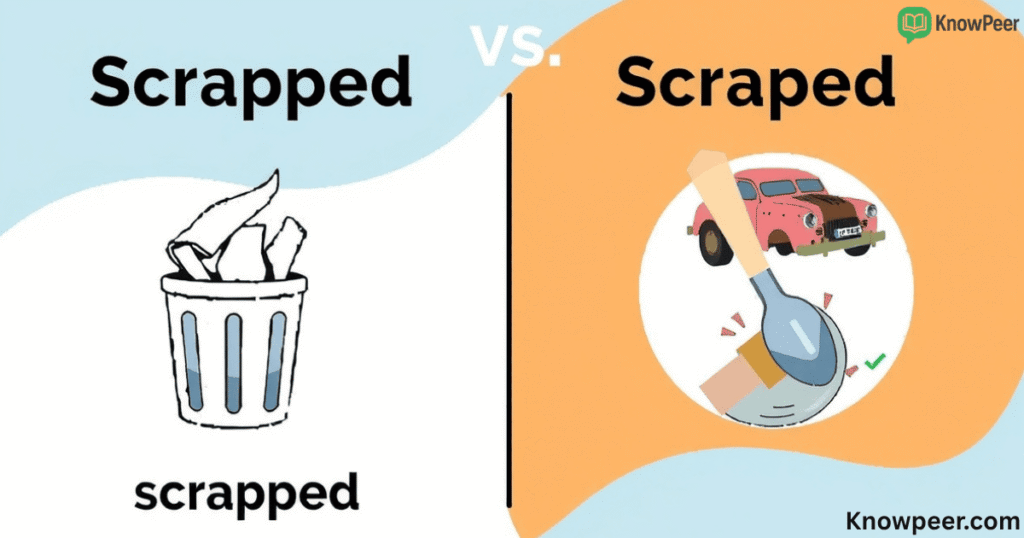Introduction
Many people confuse the words vicious and viscous, especially when writing or reading quickly. These two words may sound similar, but they have very different meanings. One relates to cruelty and violence. The other describes how thick or sticky a liquid is Vicious vs Viscous. This small mix-up can cause a sentence to change its meaning completely or make it sound funny without intending to. When someone says a person had a “viscous temper,” they probably meant “vicious temper.” These errors are not only awkward but can hurt your message’s clarity.
Understanding the difference between vicious and viscous is important for students, writers, bloggers, and anyone who wants to communicate clearly. Whether you’re writing a novel, sending an email, or explaining science in class, using the correct word shows that you care about detail. It also helps readers trust your message. In this article, we will explore what each word means, where they come from, how to remember them, and how to use them correctly with lots of examples, tables, and real-life cases.
What Does ‘Vicious’ Mean?
The word vicious is used to describe something cruel, evil, or harmful. It is often linked with behavior, emotions, or actions that cause pain or injury, either physically or emotionally. For example, a vicious dog might bite without warning Vicious vs Viscous. A vicious rumor might destroy someone’s reputation. This word often carries strong emotional weight. It can be used to describe people, attacks, cycles, gossip, and actions meant to hurt others. It doesn’t just mean bad; it means aggressive, dangerous, and sometimes mean-spirited.
In social and psychological contexts, vicious is also used to describe toxic behavior, abuse, and uncontrolled anger. In phrases like “vicious cycle,” it describes a repeating situation that keeps getting worse, like poverty leading to poor education, which leads to unemployment, and so on. Here’s a look at common uses:
| Phrase | Meaning |
| Vicious attack | A violent or harmful physical assault |
| Vicious rumor | A damaging lie or story spread about someone |
| Vicious dog | An aggressive and dangerous animal |
| Vicious cycle | A repeating problem that makes itself worse |
| Vicious insult | A deeply hurtful or harmful comment |
What Does ‘Viscous’ Mean?
The word viscous refers to something that is thick, sticky, and flows slowly. It is most commonly used to describe liquids that do not pour easily, such as honey, syrup, or motor oil. In scientific terms, viscosity is the measure of a fluid’s resistance to flow. The more viscous a liquid is, the slower it moves. Water has low viscosity. Molasses has high viscosity.
In everyday life, viscous is used in cooking, science, manufacturing, and engineering. For example, chefs need to know the viscosity of sauces to make the right texture Vicious vs Viscous. Scientists test the viscosity of liquids to understand how they behave under pressure. Car engineers care about viscosity when choosing engine oils. Here’s a simple breakdown:
| Liquid | Viscosity Level | Example |
| Water | Low | Pours quickly, not sticky |
| Olive oil | Medium | Slightly thick but flows |
| Honey | High | Thick and slow-moving |
| Tar | Very High | Barely moves at room temperature |
How They Sound Similar but Mean Totally Different Things
The confusion between vicious and viscous often comes from how they sound. Both start with a “v” and end with “-ous.” Their middle sounds—“shuhs” and “skuhs”—can be hard to tell apart when someone speaks quickly. They are not homophones in the strictest sense, but to the untrained ear, they are phonetic near-twins.
Here’s the phonetic breakdown using the International Phonetic Alphabet (IPA):
| Word | IPA | Pronunciation Tips |
| Vicious | /ˈvɪʃ.əs/ | Starts like “vish” (like fish) |
| Viscous | /ˈvɪs.kəs/ | Starts like “visk” (like risk) |
Try saying them aloud and feel the difference in your mouth. One sounds smooth; the other feels sharper. It helps to slow down your speech and emphasize the middle syllables when writing or reading them.
Real-World Examples that Show the Confusion

Confusing vicious and viscous is not just an academic mistake. It happens in real writing. In one online product review, a customer said, “The cleaner had a vicious texture and stuck everywhere.” The writer likely meant “viscous,” as cleaners don’t behave like aggressive animals. Another example showed up in a blog where someone described a child’s “viscous temper.” While amusing, this kind of error can hurt your credibility.
| Incorrect Sentence | Corrected Sentence |
| The cake batter was too vicious to pour. | The cake batter was too viscous to pour. |
| She gave me a viscous look full of hatred. | She gave me a vicious look full of hatred. |
| His argument turned viscous when challenged. | His argument turned vicious when challenged. |
Each mistake changes the meaning and makes the sentence confusing. Even software spellcheckers sometimes miss these because both words are correct in spelling.
Vicious in Action: Media, Behavior, and Language
In news headlines, books, and films, the word vicious appears when describing intense or dangerous situations. News outlets often use “vicious” to describe crimes, such as vicious assaults or vicious robberies. These stories highlight how aggressive and harmful human behavior can be Vicious vs Viscous. In books, especially thrillers or dramas, characters might be described as vicious villains to show their evil traits.
Psychologists also use “vicious” to describe emotional manipulation, abusive cycles, or self-destructive patterns in relationships. Saying someone has a vicious tongue means they often say hurtful things. This word carries deep emotional power and should be used carefully to reflect serious harm or danger.
Viscous in Action: Science, Cooking, and Materials
The word viscous is mostly used in science, engineering, and cooking. For instance, in physics, the viscosity of a liquid affects how it flows through pipes or reacts to heat. In cooking, thick sauces or gravies need to be just viscous enough to coat food but not stick too much. Food scientists even measure the viscosity of ketchup to control its texture in bottles.
In industry, viscous fluids are common in oil refineries, paint production, and chemical labs. For example, car engines need oils with the right viscosity rating to perform in hot or cold conditions. If the oil is too thin (low viscosity), it might not protect the engine parts Vicious vs Viscous. If it’s too thick (high viscosity), it might slow the engine down.
Origin Stories: Tracing the Roots of Each Word
Understanding the origin of words often helps in remembering their meanings. Vicious comes from the Latin word “vitiosus,” meaning “full of faults” or “morally wrong.” Over time, the English language changed it to mean cruel, violent, or harmful.
On the other hand, viscous comes from the Latin word “viscosus,” meaning “sticky” or “slimy.” It was first used in scientific and cooking contexts during the 17th century. Their similar Latin roots may partly explain why they sound so alike, but their modern meanings have grown far apart.
| Word | Latin Root | Original Meaning | Modern Use |
| Vicious | Vitiosus | Faulty, morally wrong | Aggressive, cruel, or harmful |
| Viscous | Viscosus | Sticky, gluey | Thick, slow-flowing, resistant to flow |
Synonyms and Antonyms: Expand Your Vocabulary Intelligently
To understand vicious and viscous more deeply, it helps to know their synonyms and antonyms. This not only improves vocabulary but also makes writing more vivid and precise. Let’s look at both sides:
For Vicious:
Antonyms: gentle, kind, peaceful, caring, calm
For Viscous:
Synonyms: thick, sticky, syrupy, gooey, dense
Antonyms: runny, watery, fluid, loose, thin
These help when you’re trying to avoid repetition in your writing or want to describe something more exactly.
Mnemonic Devices to Never Mix Them Up Again
Memory tricks can be useful. Here’s one:
“Vicious has an ‘I’—think of ‘injury’ or ‘intent to harm.’
Viscous has an ‘S’—think of ‘syrup’ or ‘sticky substance.’”
Another fun one is to remember that “a vicious dog bites, while a viscous dog drools.” Both are messy situations, but one involves danger and the other just a towel. Creating your own memory tool can make this stick better in your head.
Common Idioms and Collocations
“Vicious” appears in several idioms, like “vicious cycle,” which describes a problem that repeats and grows worse. Another is “vicious rumor,” which spreads harmfully. “Viscous,” on the other hand, is more technical and doesn’t appear in idioms. But it’s often used with specific collocations like “viscous liquid,” “viscous fluid,” or “viscous material.”
From Dictionaries to Real Talk: What Usage Experts Say

Language experts often warn about confusing these terms. Grammarist.com explains that “vicious is about cruelty,” while “viscous is about thickness.” Dictionaries like Merriam-Webster and Cambridge also highlight the emotional vs. physical contrast between these words Vicious vs Viscous. Linguists say that such confusions are phonological slip-ups, which means the brain hears or sees something similar and assumes it’s correct.
The Importance of Word Precision in Clear Communication
Precision in language builds trust. Whether you’re writing for work, school, or social media, using the right word helps your audience understand you faster and better. Misusing a word—even slightly—can cause confusion, laughter, or criticism. Especially in professional settings, knowing the difference between words like vicious and viscous shows you care about accuracy.
Bonus Section: Try These Sentences — Can You Spot the Error?
Here’s a quick table. Try spotting which word is wrong:
| Sentence | Correct or Incorrect? |
| The syrup was too vicious for pancakes. | Incorrect |
| His viscous personality made everyone nervous. | Incorrect |
| The lava flowed slowly because it was viscous. | Correct |
| That was a vicious lie she told. | Correct |
Conclusion
Understanding the difference between vicious and viscous may seem like a small detail, but it has a big impact on how clearly and confidently you communicate. One word speaks of cruelty and aggression, while the other belongs to science and texture. Mixing them up not only causes confusion but can also change the meaning of your message entirely. That’s why learning their meanings, origins, and proper uses is so important, especially in writing where tone and accuracy matter.
By now, you’ve seen how each word works in action, how they’re spelled and pronounced, and how to remember them using simple tricks. From news reports and emotional language to scientific formulas and cooking tips, these two terms live in completely different worlds. So the next time you reach for one of them in your writing, pause and think: is it a vicious rumor or a viscous sauce? The answer makes all the difference.











